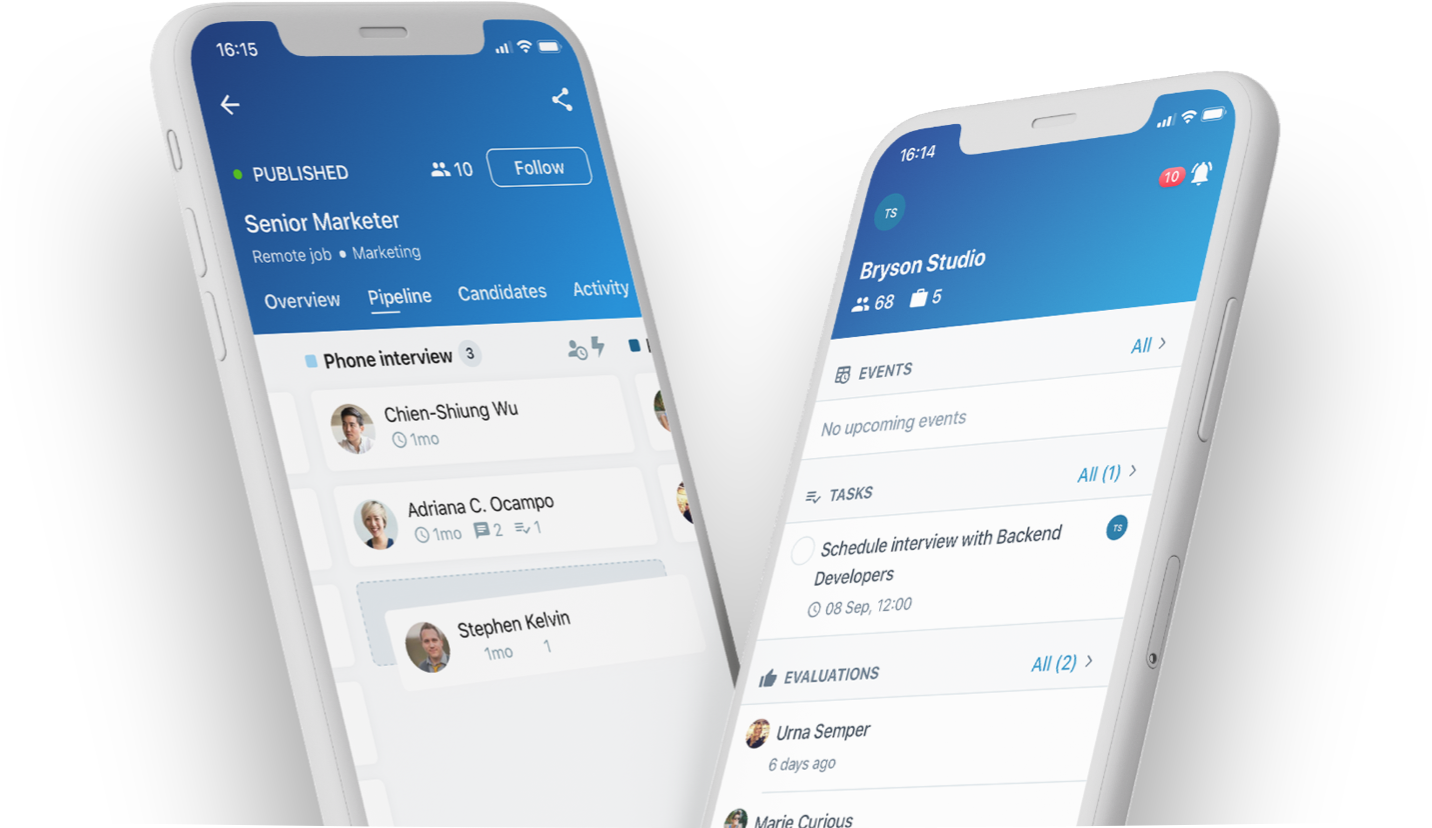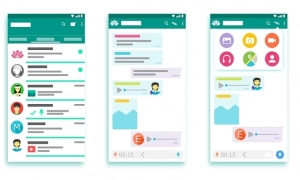
All of us love a comfortable and convenient life. And today, there are a huge number of smart machines that understand and analyze human behavior, simplifying our daily lives, making our days more enjoyable than we have ever imagined.
Machine Learning (ML) and Artificial Intelligence (AI) are revolutionizing the industry. These technologies are designed to change the way we use various devices and run our businesses for the better. And it seems like they are doing their job great!
Today, as these technologies evolve, every industry is adapting them to transform and grow their businesses.
Artificial Intelligence in Mobile App Development
Mobile apps are constantly evolving, and Artificial Intelligence (AI) is rapidly empowering this evolution by increasing the number of intuitive applications for various industry sectors.
Today's companies know how important it has become to develop customized solutions according to client requirements. Understanding customer behavior can help businesses serve them more efficiently. This is becoming possible through machine ML and AI-based mobile app development.
As thousands of software products and apps enter the current industry, services, and products need to be unique to look different from their competitors, as well as meet ever-increasing customer standards.
Customers today are focused on smartphone apps such as various mobile assistants and problem-solving solutions. The learning ability and adaptability of AI allow companies to meet customer demands by creating a customized experience for each individual user.
With that said, let's take a look at how the technology, offered by AI and ML, can affect custom mobile app development and how you can integrate them into your mobile app.
How AI and ML are Used in Mobile App Development
To start with, here are a few basic examples of how AI and ML are used in mobile app development:
- Special insights. Gmail offers smart responses;
- Smart tips. LinkedIn helps match candidates and jobs;
- Deep personalization. Amazon shows recommendations based on search queries;
- Smart interaction. Facebook provides proactive discovery;
- Auto suggestions. Google Chrome helps with predictive search;
- Object identification. Pinterest helps identify an object in an image, etc.
For any business, making a profit is essential for prosperity. However, this can only be achieved by retaining existing users and attracting new ones. Businesses can take advantage of this by integrating ML and AI into apps.
For example, AI technology combined with industry-leading mobile app trends gives the user fantastic help in many ways:
- With basic app functions, AI offers additional ones by collecting and storing user data and analyzing user behavior;
- AI collects information about a user's location, recent contacts, and time of interaction with the app. It also provides the user with better and more specific assistance;
- Due to the constant change in user demand, AI is chosen as the best and most reliable tool to enrich a mobile app in all aspects. Retail giants like Amazon and eBay have proven the importance and power of AI apps;
- Many IT companies strategically integrate AI with their best products to maximize profits with a satisfying and impeccable user experience. This benefits businesses in terms of high user engagement;
- An AI-powered app collects all user information on a daily basis and uses important details to regularly show or promote user-oriented content, which ultimately benefits the business. It also improves advertising.
Speech Recognition Technology
With the development of interactive voice control, speech recognition has become a new integration trend in mobile apps. We are all well aware of this technology thanks to Cortana and Siri systems, which help in decoding and converting human language and emotions into a language that a computer can understand.

Emotion Recognition
Technology is becoming more sensitive to understanding the demands of its customers every day. Emotion recognition is an attractive AI-based technology that helps various software and apps recognize emotions through the face. This is done using advanced audio data and progressive human face image processing.
Image Recognition
Almost every phone already is equipped with facial (image) recognition. However, in addition to smartphone operating systems, this technology is also used in several mobile applications. It can also be used to identify and detect an object from multiple images or videos. This technology is already being used for license plate identification, user verification, disease diagnosis, and more.
Reasoning
Reasoning is one of the most important skills a machine or application should have. Machines developed previously did not have this feature. Now, however, it's possible thanks to the integration of AI.
Take Uber for instance. The cab giant uses AI in its app and helps drivers find the exact route to pick up or drop off customers at their destination. The same AI technology also informs the driver of the specific route that will be the shortest so that the customer can get to their destination ASAP.
In this way, many other businesses can use AI to make the interface of their apps better and smarter for their users.
Chatbots
Chatbots and voice managers have helped AI solutions reach new standards. Integrating these technologies into any business app can help achieve high levels of customer satisfaction. They interact effectively with users online and get their feedback.
Natural Language Processing
Natural language processing is booming in 2021. That's why big firms like Digital Reasoning, Attivio, Cambridge Semantics, SAS, Automated Insights, and many others are using natural language technology for customer-service-related apps and include market reviews or report generation.
Biometrics
Numerous market research organizations use biometrics to recognize, measure, and analyze people's behavior and physical aspects of their bodies (structure/shape). All of this is accomplished through gesture control, image/voice control, and sensory recognition.
This is all about what AI software can offer us. However, you should also know about risks.
Let's discuss a few of the main problems that AI faces when developing mobile applications.
AI and Mobile App Issues
Privacy
Technology giants have already stated that AI can put people on the map by becoming smarter than humans themselves. However, there's another major problem with privacy breaches in AI-powered mobile apps.
There are extreme demands on companies: to put great effort into their apps to preserve and protect user data. Moreover, they must also ensure safe data collection and sharing practices to avoid any unnecessary attacks on customer privacy.
Ongoing Software Updates
With constant technology updates, any AI software will require constant updates to stay relevant. Consequently, teams need to keep an eye out for new updates to the app on a regular basis.
AI is mainly used to handle the huge amount of data that is collected and stored by the app, however, it needs to be focused on how that data should be used.
Artificial Intelligence and App Content
Users currently see a recommended section in some apps. This mostly happens in content-rich apps. And AI technology determines the way users interact with them.
The type of article or content that users read the most is being tracked, and, based on that, a recommendation section is created for everyone. This app recommendation section is personalized for each user, which is possible solely because of AI.
How Do You Integrate ML and AI into Apps?
First, you need to define the problem you want AI to help you solve. Recognize your data and understand from the start that using APIs won't be enough.
Next, you need to choose metrics you want the AI to work according to. Next, you can't do without the help of data analysts.
Introducing AI and ML into an app requires a drastic change in the way the app works. With that said, let's consider each implementation stage step by step.
Problem Definition
There are many different areas where AI and ML can be used in your mobile business.
Identifying the main areas and the problem that needs to be solved is the first thing to do. Referral systems, customer service, security systems, and data-based insights are just a few examples.
Think about what part of your app could benefit from AI. Could it provide a better customer experience? And then collect data from that particular area.
Recognize Your Data
Before you start implementing AI and ML in your mobile app, you need to have a basic understanding of where to get your data.
During the data acquisition and refinement phase, knowing the platforms where you can get your data in the first place will help you. Next, for data refinement, always make sure that the data you want to enter into your AI module is truly informative, unique, and clean.

Predictions Based on AI
When you have mobile apps on your phone, pop-up notifications and product discounts/offers are common. This is done to attract more customers and engage existing customers.
But that being said, AI plays a crucial role in this. AI algorithms can track a user's purchase and search history and then provide them with personalized offers. These can be simple predictions but there are situations where users actually buy recommended products. Consequently, it's vital for companies to hire mobile app developers who can help them integrate AI with their apps.
Understand that APIs are not enough.
When introducing AI into a mobile app, keep in mind that the more widely APIs-application programming interfaces are used, the more insufficient they are.
APIs aren't enough to support a heavy, full-blown AI solution, however, they can convert your regular app into an AI app. This means that the more intelligent model you're looking for, the more you need to work on data modeling - roughly something that APIs alone can't solve.
Decide on Metrics
For an AI implementation, you need to decide on your specific goal. There's no point in implementing ML or AI features into your mobile app until you have a method for measuring its effectiveness. This is only possible after you know exactly what you want to get out of it. Therefore, you need to understand what you want to achieve before you implement ML or AI in your mobile app.
Bringing in Data Analytics Professionals
Hiring a data analyst or outsourcing such work to a mobile app development agency with its own team of data analysts is the most important step.
With such experts, all your data management and refinement needs will be in safe hands.
Machine Learning in Mobile App Development
In mobile app development, machine learning refers to a complete AI-based mechanism solution designed to provide a universal approach to solving web problems. Its algorithms are based on a continuous learning algorithm, so that end users can also get a better experience. Machine learning helps mobile apps recognize the same pattern applied by the user, and it continually builds on those patterns. Nowadays, almost every app that is ready to improve its performance has an artificially built-in machine learning capability at its core.
Even after all this, there's a huge bridge between actual individualization and personalization, and you can't satisfy users with an app that lacks any important features. With the development of AI, you can bridge the gap as it helps you understand users' behavior and help them solve their next tasks. It also helps keep them entertained and engaged. Globally, this technology makes the platform user-friendly with improved versions of its features. Custom mobile app development also helps maintain the perfect omnichannel user experience.
Benefits of ML in Mobile App Development
In order to create custom mobile app development, machine learning has much more to offer you. Not only do they provide help and support but they also help you do analytical work to increase user engagement with your app. Companies are looking at many artificial intelligence solutions every day to stand out from the crowd.
Let's find out how machine learning helps in mobile app development.
Enhanced Individual Experience
Machine learning allows digital units to continue the learning process. Its algorithms tend to rate and analyze the information available on social media. Let's say that whenever a customer starts accessing an app, ratings and recommendations will be displayed one by one as soon as he/she starts browsing.

Active Communication
As machine learning analyzes and categorizes available information, it also helps you organize customers based on their preferences. You can offer the most relevant and appropriate content to convey a real experience with your app. Thus, an Android app development company applies resources in unimaginable ways to make the most of the given opportunities.
Advanced Search
Machine learning in mobile app development solutions helps optimize and balance search in the app. It will also control delivery time and improve contextual results. Most of the time, customers will find it boring and time-consuming. However, with ML in your app, you can make the process more intuitive.
It also collects available information about customers, e.g. history, search queries, or any other activities. Advanced app search will also help you analyze information, predict customer behavior, and rank them to provide the best matching results.
Predicted User Behavior
With the development of AI, marketers, and app development companies are placing more importance on user preferences and choices. Based on the availability of different types of data, behavioral diversity is used for better experiences. The following factors are included:
- Age;
- Gender;
- Geo-location;
- Search queries;
- Frequency/intensity of app usage.
Integration with machine learning will help you create a specialized measurement for each person, which greatly increases customer engagement.
Relevant Advertising
Sometimes the very term "advertising" is tiresome, but if you don't engage the exact technology, the situation can get worse. AI helps show the right ads for each audience group. Ads have now become one of the main assets of machine learning technology, which helps companies showcase their services or products to users.
Safe Improvisations
Machine learning has allowed apps to simplify and secure app authentication, audiovisual data. With voice recognition, customers authenticate themselves using biometrics, their faces, or fingerprints. Some apps have already started using ML capabilities for their security. And others allow users to log in with wet-selfie-style face authentication.
ML is also being recognized in the prominent banking and financial sectors. Plus, it helps verify a consumer's transaction history, social media activity, and more.
All of these combine to help determine a user's credit rating, as well as provide access to a variety of features:
- Image recognition:
- Logistics optimization;
- Business intelligence;
- Product labeling automation.
Increased User Engagement
AI-based solutions allow companies to offer consistent customer support and a range of features. Some applications also provide little incentive for users to use the app on a regular basis. Even for fun, a chatty AI-based assistant will help your customers and keep the conversation going at all times.
Conclusion
In this digital age, a revolution is needed to integrate AI with the latest technologies. AI introduces every mobile app and computer network with a "smart" connection that offers users a more personal experience. Although it was originally adopted only for the application program interface (API), with its enhancements and powerful processors, all mobile devices are ready to welcome apps integrated with AI.
In addition, general ML technology has really empowered websites and mobile apps and attracted a number of users. Since it offers an advanced research mechanism, secure authentication, protection against any fraud, and relevance, Android app development companies rely on the same.
So, with this article, we can conclude that the need to integrate Artificial Intelligence and ML with mobile apps is definitely beneficial for users and businesses as they enhance the interaction and performance of apps.


